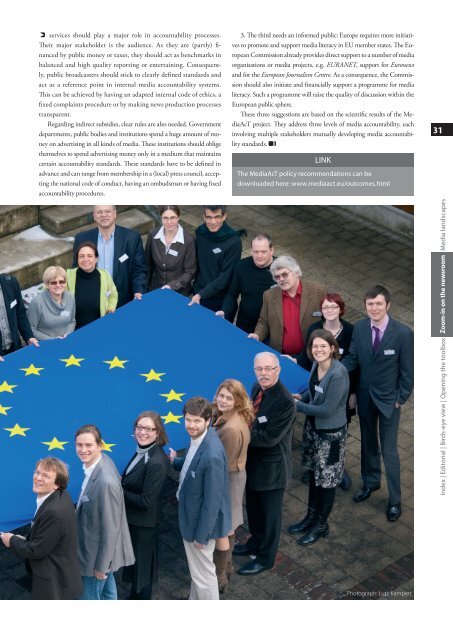MediaAcT
How fragile is media credibility? Accountability and transparency in journalism: research, debates, perspectives Final Research Report | Media Accountability and Transparency in Europe
How fragile is media credibility? Accountability and transparency in journalism: research, debates, perspectives
Final Research Report | Media Accountability and Transparency in Europe
You also want an ePaper? Increase the reach of your titles
YUMPU automatically turns print PDFs into web optimized ePapers that Google loves.
services should play a major role in accountability processes.<br />
Their major stakeholder is the audience. As they are (partly) financed<br />
by public money or taxes, they should act as benchmarks in<br />
balanced and high quality reporting or entertaining. Consequently,<br />
public broadcasters should stick to clearly defined standards and<br />
act as a reference point in internal media accountability systems.<br />
This can be achieved by having an adapted internal code of ethics, a<br />
fixed complaints procedure or by making news production processes<br />
transparent.<br />
Regarding indirect subsidies, clear rules are also needed. Government<br />
departments, public bodies and institutions spend a huge amount of money<br />
on advertising in all kinds of media. These institutions should oblige<br />
themselves to spend advertising money only in a medium that maintains<br />
certain accountability standards. These standards have to be defined in<br />
advance and can range from membership in a (local) press council, accepting<br />
the national code of conduct, having an ombudsman or having fixed<br />
accountability procedures.<br />
3. The third needs an informed public: Europe requires more initiatives<br />
to promote and support media literacy in EU member states. The European<br />
Commission already provides direct support to a number of media<br />
organisations or media projects, e.g. EURANET, support for Euronews<br />
and for the European Journalism Centre. As a consequence, the Commission<br />
should also initiate and financially support a programme for media<br />
literacy. Such a programme will raise the quality of discussion within the<br />
European public sphere.<br />
These three suggestions are based on the scientific results of the <strong>MediaAcT</strong><br />
project. They address three levels of media accountability, each<br />
involving multiple stakeholders mutually developing media accountability<br />
standards.<br />
lInk<br />
The <strong>MediaAcT</strong> policy recommendations can be<br />
downloaded here: www.mediaact.eu/outcomes.html<br />
Photograph: Lutz Kampert<br />
1<br />
Index | Editorial | Birds-eye view | Opening the toolbox | Zoom-in on the newsroom<br />
| Media landscapes


